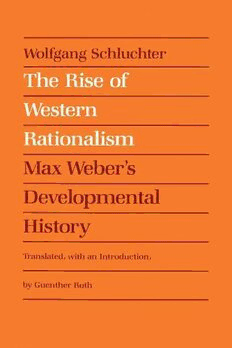
The Rise of Western Rationalism: Max Weber's Developmental History PDF
Preview The Rise of Western Rationalism: Max Weber's Developmental History
The Rise of Western Rationalism The Rise of Western Rationalism Max Weber's Developmental History Wolfgang Schluchter Translated, with an introduction, by Guenther Roth UNIVERSITY OF CALIFORNIA PRESS Berkeley · Los Angeles · London This book is a print-on-demand volume. It is manufactured using toner in place of ink. Type and images may be less sharp than the same material seen in traditionally printed University of California Press editions. University of California Press Berkeley and Los Angeles. California Universit.v of California Press, Ltd. London, England First published in 1979 hy Verlag J.C.B. Mohr fPaul Sieheckl © 1981 hy The Regents of the University of California Fir·st Papt~rhack Printing 1985 ISBN 0·520·05464·4 Printed in the United States of America Library of Congress Cataloging In Publication Data Schluchter, Wolfgang, 1938- The rise of Western rationalism. Translation of: Die Entwicklung des okzidentalen Rationalismus I. Weber·, Max, 1864-1920. 2. History-Philosophy. 3. Rationalism. 4. Historical sociology. 5. Religion and sociolog_v. 6. Political scienee-Philnsophy. I. Title. B336l.Z7S3413 301 81·2763 AACR2 ''The realm of values is dominated by insoluble conflict, hence by the ne cessity for continuous compromises. Nobody can definitively decide how the compromises should be made, unless it be a 'revealed' religion." Max Weber in a letter to Robert Wilbrandt, April2, 1913. Cited by W.j. Mommsen, Mar Weber und die deutsche Politik. 1890-1920. CONTENTS Preface ix Abbreviations xi Introduction by Guenther Roth xv Chapter I. Introduction 1 Chapter II. Weber's Historical Problem 6 The Distinctiveness of Western Capitalism 6 The Distinctiveness of Western Rationalism 9 Chapter III. The Philosophical Background ofWeber's Developmental History 13 The Relation to Neo-Kantian Value Theory 13 Value Theory as a Theory ofValue Conflict 19 Chapter IV. The Substantive Content ofWeber's Developmental History 25 A. Presuppositions and Basic Concepts 25 Value-Spheres and Institutional Realms 25 Levels and Dimensions ofS ocial Relations 30 B. Basic Configurations ofSocial Order 39 1. The Ethical Component 39 l)'pology of Ethics 39 Ethics and the Idea of Compensation 48 Ethics and Types of Conscience 59 Revised l)'pology of Ethics 62 Questionable Classifications: Confucianism andjudaism 67 2. The Institutional Component 70 l)'pology of Differentiation 70 Classes and Status Groups 78 viii Contents Chapter V. '!)'pes of Law and '!)'pes of Domination 82 1. The Relation Between the Sociology of Domination and of Law 82 2. The Sociology of Law 87 '!)'pes of Law 87 Formal Modes ofL aw 89 Substantive Modes of Law 97 The Differentiation of the Substantive Fields of Law 99 The Relation ofEthics and Law 101 3. The Sociology of Domination 106 Traditional Domination: The Guiding Principle of Personal Loyalty 106 Rational Domination: The Guiding Principle ofLegality 107 Traditional and Rational Domination Compared 118 Charismatic Domination: The Mission as Guiding Principle 121 The Sociology of Domination Reconstructed 126 4. Sociology of Domination and 'I)'pology ofA ction 128 5. Preliminary Conclusion 133 Chapter VI. The Role of the Reformation in the Transition to Modernity 139 Methodological Aspects of the Sociology of Religion 139 The Analysis of the Breakthrough in the Study ofA scetic Protestantism 141 The Analysis of the Breakthrough in the Comparative Studies of Religion and Economy 148 The Cultural Significance ofC hristianity: A Comparison of the World Religions 156 The Cultural Significance ofA scetic Protestantism: A Comparison ofS alvation Movements During the Reformation 166 Chapter VII. Conclusion 175 Index 177 PREFACE This study does not intend to interpret all of Max Weber's work, but it is a systematic analysis with a methodological and a substantive aspect. Methodo logically, I am concerned with Weber's relationship to evolutionism and neD evolutionism, substantively with the problem of historical rationalization. A systematic perspective must not arbitrarily isolate Weber's major writings from one another. Methodology and substantive sociology must be considered to gether; the same holds for the sociologies of religion, law, domination and econ omy from both "parts" of Economy and Society and for the studies on the eco nomic ethics of the world religions. The present analysis builds upon and elaborates my previous effort, in Max Weber~ Vi.sion ofHi.story, to explicate We ber's limited evolutionary program and his theory of rationalization on the basis of the sociology of religion alone. I have benefitted from many discussions and suggestions, which I have not always been able to document. I would like to single out the conference on We ber's theory of rationalization at the University of Constance in 1977 (published by Constans Seyfarth and Walter Sprondel, eds., Max Weber und das Problem des gesellschaftlichen Handelns, Stuttgart: Enke, 1981) and the seminar on We ber's value theory and theory of history that I conducted with Dieter Henrich at the University of Heidelberg in 1977. I would also like to mention a discussion withjiirgen Habermas and his staff at the Max Planck Institute at Starnberg in 1978. I have greatly profited from Habermas' forthcoming study on action ra tionality and system rationality, which I read as a manuscript. Finally, I recall the many conversations I had with Guenther Roth during the writing of the manuscript in the summer of1978. Brigitte Schluchter supported the writing of the book in many ways, and I would like to thank her especially. Heidelberg Wol(~ang Schluchter
